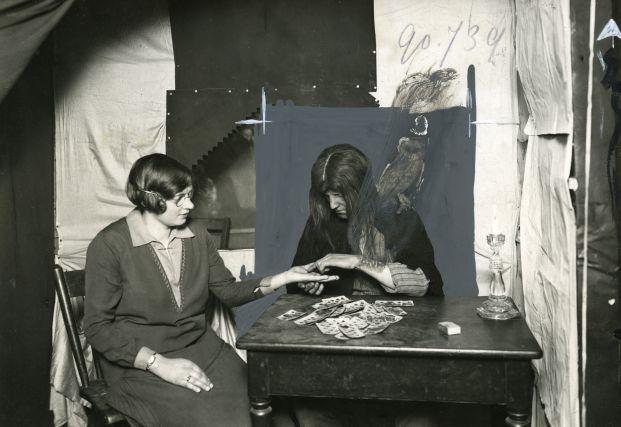A few years ago, I was sitting in my office when suddenly a flash came before my eyes. I darted upstairs to breathlessly tell my husband “I just had a vision! Someone is going to give me monkey socks!” He looked at me quizzically and then continued on with what he was doing. Months later, one of my clients sat down for a reading and casually said “I have a present for you” and proceeds to hand me a pair of green socks with monkeys on them! I almost fell out of my chair as I quickly ran upstairs to excitedly show my husband. “Great… my wife can predict a pair of monkey socks but not the winning lottery numbers.” he replied with a smirk and rolling eyes.
Living with a psychic has taken some of the element (and excitement) of surprise away from him. I’ve even managed to ruin many a birthday and holiday as I am such a good gift guesser that he must now resort to elaborate schemes to get me off the scent. I often will deliver an answer before he even utters the question. So he no longer gets a thrill when I have a “vision”. When every day is prediction day, it becomes second nature and rather common.
Thank goodness my clients never tire of it though or I’d be talking to a blank wall. Working as a tarot reader has allowed me to utilize my intuition in a way that can aid my clients and help them to navigate life’s ups and downs with a bit more grace. However, I have noticed that “fortune telling” has fallen out of favor in my line of work. Many tarot readers and other intuitives shy away from it. Why?
One reason is that some modern tarot authors have presented the tarot as a tool for psychoanalysis – and a new trend of using tarot not as a fortune telling device but as a method of therapy has become very popular. Some authors prescribe to an “interactive” style of tarot reading where the querent looks at the cards and tells the reader what they mean to them, turning a tarot session into a therapy session. While this can be helpful in many cases, the art of prediction gets lost in the process.
An argument I have heard is that fortune telling is “disempowering” or “unethical”. How? Its been said that a predicted event implies that the querent has “no control” over their lives. As a huge believer in free will, I find this to be nonsense. After all, nothing is cut in stone. In my opinion, having an idea of what may transpire empowers a client in a major way. It’s like doing a road trip with a map. If you have an idea of where you are going, can’t you decide if you want to go down a different path if you don’t like the view? And isn’t that easier to do when you have the map in hand?
Another consideration is the ego factor. We tarot readers tend to be a sensitive lot. Some are not comfortable with the idea that they’ll be proven wrong. Like weathermen, we look at the patterns and make predictions to the best of our abilities. It is definitive fact that only a certain percentage of our predictions will truly hit the mark. That is why this is not work for lightweights or people who are controlled entirely by their egos. It takes a fair amount of cojones to make a prediction. A thick skin is mandatory because in this line of work you’re fair game, and many people will WANT you to be wrong. Using the tarot as therapy may be safer in some ways, but you shouldn’t let the “fear of being wrong” inhibit you from making predictions and giving your client’s reading the full breadth and depth that could provide them the insight they need to guide their lives in a truly practical way.
It may be intimidating to use the tarot to predict But think about it this way – why do people come to see psychics, tarot readers and astrologers? They come to learn about future events. Not providing this service to a client is akin to visiting a dentist who talks about cleaning your teeth rather than actually doing it.
Blessings!
Theresa
www.thetarotlady.com
I’d love to hear your thoughts about predicting. Leave your comments below!


 I’m Theresa Reed (aka, The Tarot Lady). I’ve been a full-time tarot reader for 30+ years — which, in my industry, makes me pretty badass.
I’m definitely not your average Tarot expert — I drop the F-bomb, I quote rappers, and I’m obsessed with pop culture. Folks come to me for straight-talk + tough-love — without the woo-woo fluff.
I’m Theresa Reed (aka, The Tarot Lady). I’ve been a full-time tarot reader for 30+ years — which, in my industry, makes me pretty badass.
I’m definitely not your average Tarot expert — I drop the F-bomb, I quote rappers, and I’m obsessed with pop culture. Folks come to me for straight-talk + tough-love — without the woo-woo fluff.
You must be logged in to post a comment.